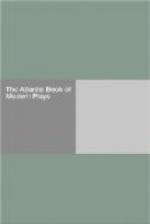FAME (picking up quill). Here, what’s this?
DE REVES. Oh, that’s my pen.
FAME (after another blast on her trumpet). He writes with a quill. (Cheers from THE CROWD.)
FAME (going to a cupboard). Here, what have you got in here?
DE REVES. Oh ... er ... those are my breakfast things.
FAME (finding a dirty plate). What have yer had on this one?
DE REVES (mournfully). Oh, eggs and bacon.
FAME (at the window). He has eggs and bacon for breakfast.
THE CROWD. Hip hip hip hooray! Hip hip
hip hooray!
Hip hip hip hooray!
FAME. Hi, and what’s this?
DE REVES (miserably). Oh, a golf stick.
FAME. He’s a man’s man! He’s a virile man! He’s a manly man!
(Wild cheers from THE CROWD, this time only from women’s voices.)
DE REVES. Oh, this is terrible. This is terrible. This is terrible.
(FAME gives another peal on her horn. She is about to speak.)
DE REVES (solemnly and mournfully). One moment, one moment....
FAME. Well, out with it.
DE REVES. For ten years, divine lady, I have worshipped you, offering all my songs ... I find ... I find I am not worthy....
FAME. Oh, you’re all right.
DE REVES. No, no, I am not worthy. It cannot be. It cannot possibly be. Others deserve you more. I must say it! I cannot possibly love you. Others are worthy. You will find others. But I, no, no, no. It cannot be. It cannot be. Oh, pardon me, but it must not.
(Meanwhile FAME has been lighting one of his cigarettes. She sits in a comfortable chair, leans right back, and puts her feet right up on the table amongst the poet’s papers.)
Oh, I fear I offend you. But—it cannot be.
FAME. Oh, that’s all right, old bird; no offence. I ain’t going to leave you.
DE REVES. But—but—but—I do not understand.
FAME. I’ve come to stay, I have.
(She blows a puff of smoke through her trumpet.)
[CURTAIN]
THE CAPTAIN OF THE GATE[1]
Beulah Marie Dix
SCENE: In the cheerless hour before the dawn of a wet spring morning five gentlemen-troopers of the broken Royalist army, fagged and outworn with three long days of siege, are holding, with what strength and courage are left them, the Gatehouse of the Bridge of Cashala, which is the key to the road that leads into Connaught. The upper chamber of the Gatehouse, in which they make their stand, is a narrow, dim-lit apartment, built of stone. At one side is a small fireplace, and beside it a narrow, barred door, which leads to the stairhead. At the end of the room, gained by a single raised step, are three slit-like




